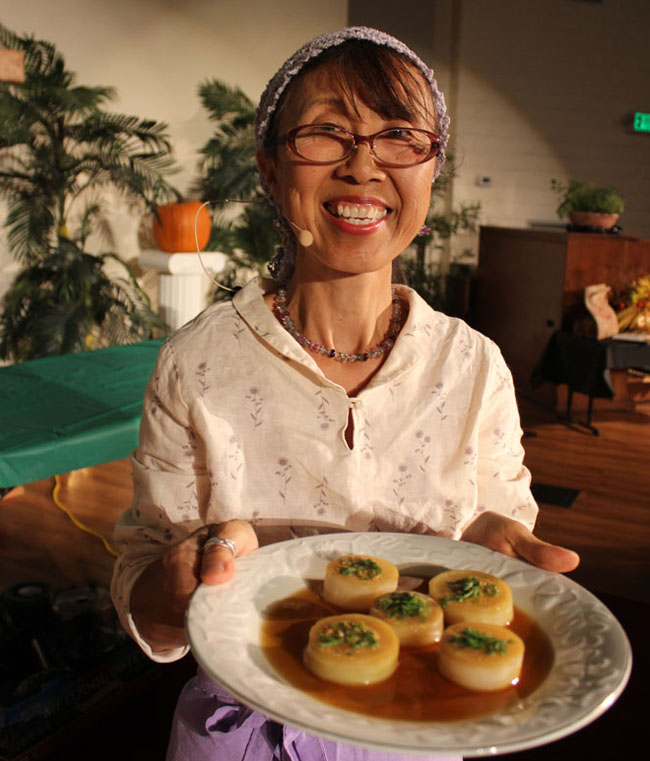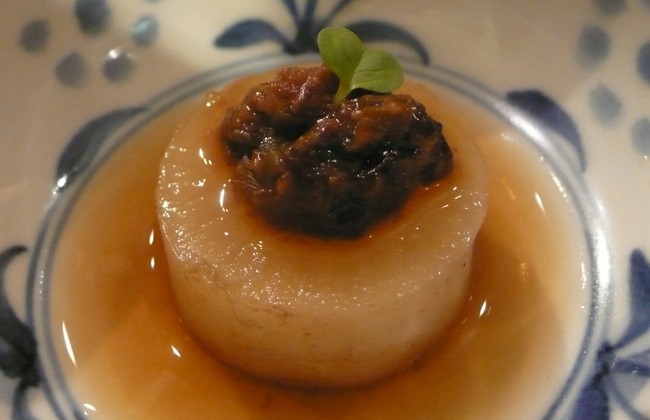Daikon means “big” (dai) “root” (kon) in Japanese. It is a big white radish you see at Asian markets and most health stores and farmers’ markets now.
When I was a child, up to 20 years old, I did not like to eat daikon unless it was made like spicy kimchee pickles. But my mother said, “Don’t worry: I did not like to eat daikon, either. I love them now, so you will love eating them when you grow up.” She was right.
Now, daikon is one of my favorite vegetables. Daikon grows in spring, summer and autumn/winter, but I love the autumn/winter (the end of October to February) ones the best. Many different kinds of daikon are available in America. Each has a slightly different taste, and the harvesting season also affects the taste. I think the summer daikons are a little bitter and winter ones are sweeter, but you can taste and find out for yourself.
Daikon helps eliminate excess water and animal fats from the body and has a wide range of medicinal uses. It also aids in the digestion of whole grains and vegetables. Here’s a quick breakdown of the health benefits:
Health Benefits of Daikon
Respiratory Health: The combination of antibacterial and antiviral activity with the expectorant properties of daikon and daikon juice make it ideal for clearing up respiratory symptoms. Daikon juice not only clears out phlegm, but also eliminates bacteria and other pathogens, keeping your respiratory system healthy.
Digestive Health: Daikon juice has been shown to possess enzymes similar to those found in the human digestive tract, including amylase and esterase.
Detoxification: Daikon has a diuretic benefit; it helps keep the kidneys clean and functioning at a high level by stimulating the elimination of excess toxins, fats, and even water through urination.
Cancer Prevention: Daikon not only has a high nutrient content, but it also possesses certain antioxidant phenolic compounds that have been shown to reduce various types of cancer, particularly of the stomach.
Immune System: The high concentration of vitamin C in daikon makes it an ideal partner for your immune system.
Anti-Inflammatory Action: Research has found that the level of anti-inflammatory compounds in daikon juice and the normal roots and leaves can significantly decrease inflammation throughout the body, lower the chance of developing arthritis, treat gout, and ease discomfort and pain from injuries and strained muscles.
Bone Health: Daikon is a rich source of calcium, which is essential for bone health. If you are at risk for developing osteoporosis or are beginning to feel the pain of your age, adding some daikon and calcium to your diet can definitely improve your conditions and slow the natural aging process.
Weight Loss: It is low in calories and contains no cholesterol, but it’s high in fiber and nutrient content, making it a weight-loss aid. It fills you up and gives you essential nutrients for your day without significantly boosting the number of consumed calories or cholesterol in your diet.
Skin Health: The antioxidant properties of daikon help to prevent the effects of free radicals, the harmful byproducts of cellular metabolism. So, you can use daikon juice or a slice of daikon for bug bites and other skin irritations.
A Word of Warning: Some evidence suggests that daikon and other radish varieties shouldn’t be eaten by people with gallstones. Other than that, daikon is not commonly known as an allergen and is generally considered healthy for anyone.
Source: Organic Facts
Furofuki Daikon (Simmered Daikon) Recipe
From Love, Sanae

MAKES 4 SERVINGS
8 rounds (each 3/4″ thick) daikon radish
2 strips (each 7″ long) kombu
4–5 tablespoons tamari
2–3 tablespoons sesame seeds, washed
2 tablespoons barley miso
4–5 cups spring water
- Put the kombu in a pot; layer the daikon on top.
- Add water to half-cover the daikon, and bring it to a boil.
- Add 1–2 tablespoons tamari for each cup of water. Cover and reduce heat to low. Simmer until daikon is tender, about 30–40 minutes.
- To make sesame-miso sauce, dry-roast the sesame seeds in a heavy skillet over medium-high heat, until lightly toasted and fragrant. Stir constantly.
- Place toasted seeds in a suribachi and grind to a paste.
- Blend in miso, and thin the mixture with 2–3 tablespoons of the cooking liquid.
- Serve the daikon topped with the sesame-miso sauce.
Enjoy!
Love, Sanae 💖

